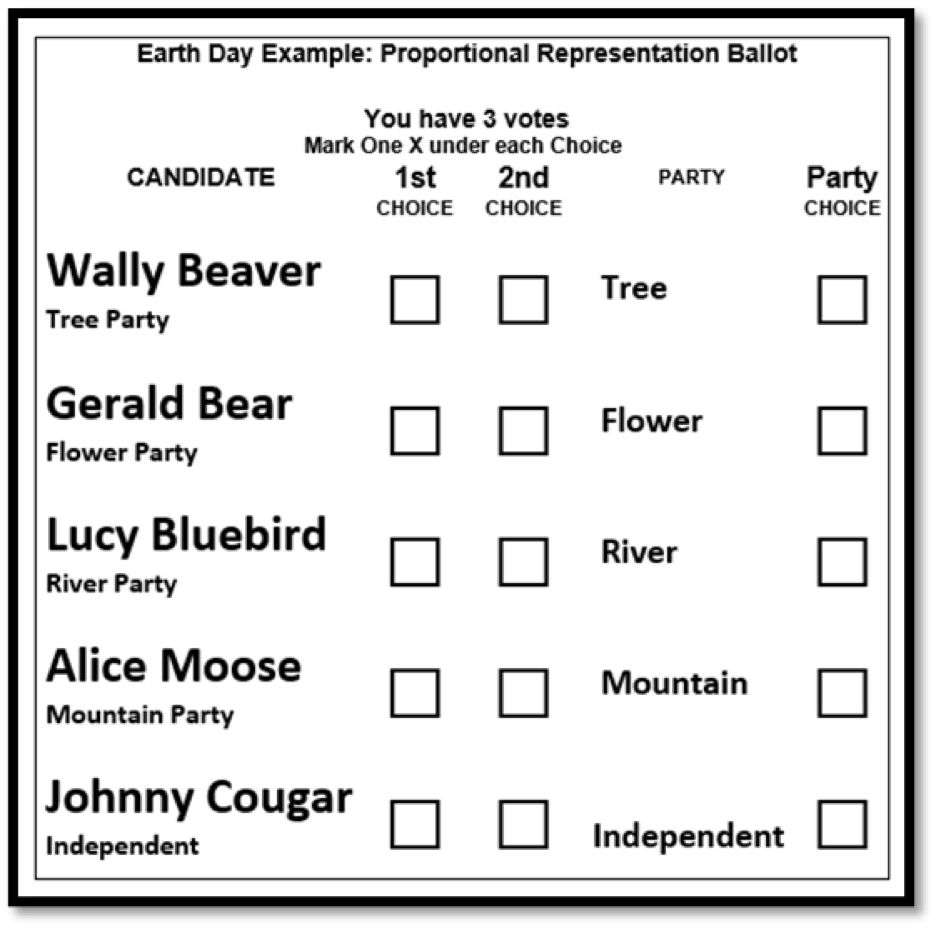Do you agree that when you vote, you want your vote to be represented by an elected representative that your vote helped to elect? When you have concerns to discuss, is that the person whom you would most like to discuss your concerns?
If it is, I’m confident that you want to consider this new point-based electoral system, Preferential Ridings Proportional with Second-choice Vote, PRP2. Here Is a sample proposed ballot for PRP2:
Inclusion and engagement are very important in representative democracies! We hope to convince you that PRP2 will greatly improve feelings of inclusion and engagement in our democracy.
The PRP2 system is the result of twenty years of mostly Yukoners responding to me on what they think we need in an electoral system.
Description of Preferential Ridings Proportional with Second-choice Vote PRP2 electoral system
Electoral areas or regions are formed and have between 4 and 10 seats; half paired-riding seats and half proportional seats. Ridings are twice as large, but you are almost assured that your vote will be effective and elect an MLA in Yukon and an MP in Canada. To implement PRP2, Yukon, other territories and provinces will require no additional seats, Canada will require only three additional seats for northern Canada, at this time probably controversial.
With PRP2, all party Candidates have two ways to win a seat: 1) Riding seat or 2) Proportional seat:
1) points from own votes only, or 2) with additional points of same party candidates’ votes. Votes for unelected candidates will help the elected, and give meaning to their own standing for election. Under FPTP and Ranked Ballot, those votes have no effect on the election outcome.
Candidates gain one point each time chosen ahead of another candidate (David Nash – Edmonton). Generally, no additional seats are needed, but ridings are two times larger. Each riding seat is won by the candidate with the most points in the candidate’s riding. The winner can be the candidate with the least 1st choice votes – if that candidate has enough points on second-choice votes. No candidates are nocked out before the final count. Green and First-Nation candidates can win seats.
Only one triple-count is needed to elect the winner. Without second-choice votes, this Mixed-Member-Proportional (MMP) system has increased vote representation under the present First-Past-the-Post (FPTP) system from less than 50% to over 90%. With PRP2’s second-choice votes, it is possible for 100% of voters to discuss their concerns with an MP/MLA whom their vote helped to elect.
In Yukon’s 2016 election under FPTP (Yukon’s most recent majority government), only 46% of ballots cast were represented in the legislature.
Would your MLA like her/his votes in the House meaningfully valued, whether in Government or Opposition (Op)? Majority governments do not need Opposition votes, so Op votes have no value. With minority governments, all votes can help to pass or defeat legislation.
We need almost all, if not all, votes represented in elections as PRP2 makes happen.
If you like this ballot and think that it could enliven change to more truly representative democracy with minority governments that require collaboration (working together), please see what a friend thinks of this ballot and/or system. Also ask your MP and MLA if they would like minority governments that work together and in which their vote always has value.
Respectfully presented,
Dave Brekke, genuinely concerned former federal Yukon returning officer (RO)
FAIR VOTE YUKON LETTER TO PARTY LEADERS -Sept 2025
2016 YUKON GENERAL ELECTION RESULT COMPARISON FOR WHITEHORSE

